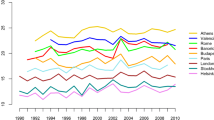Abstract.
Global climate change will have direct impacts on human health, including increased mortality due to heat stress and heat waves. An empirical-statistical model for heat stress is constructed for the city of Lisbon using the June–August months of the observational period 1980–1998. The model uses the regression of an aggregate dose-response relationship between maximum temperature and excess heat-related deaths, based on the difference between observed and expected deaths. The model is validated by correlation and residual analysis. The mean annual heat-related mortality for the period 1980–1998 was between 5.4 and 6 deaths per 100,000 depending on the method used to calculate expected deaths. Both validation methods show that the model has a moderate to high accuracy in modelling heat-related deaths compared to the observed record.
Similar content being viewed by others
Author information
Authors and Affiliations
Additional information
Electronic Publication
Rights and permissions
About this article
Cite this article
Dessai, S. Heat stress and mortality in Lisbon Part I. model construction and validation. Int J Biometeorol 47, 6–12 (2002). https://doi.org/10.1007/s00484-002-0143-1
Received:
Accepted:
Issue Date:
DOI: https://doi.org/10.1007/s00484-002-0143-1




